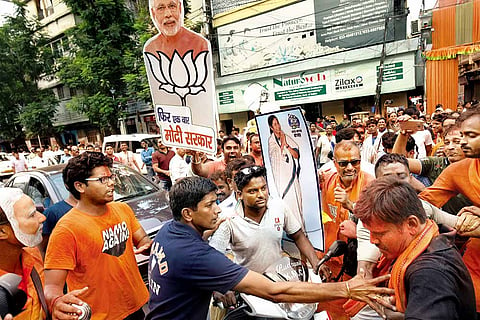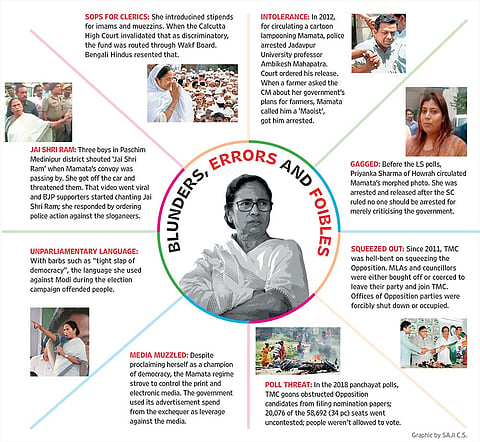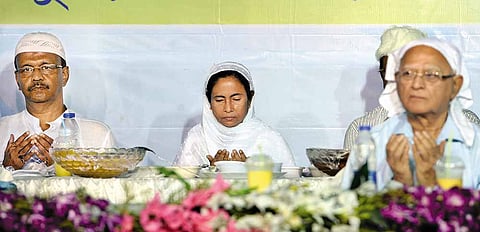Mamata Banerjee is that classic cusp figure in Indian politics. She answers perfectly to the description of a ‘regional’ leader, but has always threatened to take on a national profile. Before the elections, she even fashioned herself as a prospective prime minister, the fulcrum of an anti-BJP front. Despite her arrantly provincial bearing—very Bengali in her persona and in the politics—she has a national brand recall. When her state government faces a crisis, as is happening now, she makes headlines not just in Calcutta, but in Delhi and Bangalore too. She cut her teeth in politics in the rough and tumble of Youth Congress, as the quintessential street-fighter—four decades later, that still defines her. After her rise in parliamentary politics in 1984, she did what was thought inconceivable—vanquishing the powerful Left in its very fastness, crafting a street credo that cracked both high-minded Communist theory and its often cynical practice on the ground. But now she is engaged in a mother of all battles, and it’s coming from the ground.
Why Street Fighter Mamata Banerjee Can't Sleep Peacefully Any More
BJP's increasing vote share and clinching 18 out of the 42 Lok Sabha seats in West Bengal is a warning Mamata Banerjee can't ignore for long. BJP's Mission Bengal will test Trinamool Congress in the July 2020 Municipal elections and then the 2021 Assembly polls
After being in power for eight years as an undisputed helmswoman, she is facing a new enemy, the BJP led by Prime Minister Narendra Modi, a party that had a marginal presence in Bengal. Yet, the BJP has grown into a massive force, even threatening to unseat Mamata—a prospect as impossible as her own triumph against the Left. Winning 18 out of the 42 Lok Sabha seats in West Bengal, the BJP’s voteshare in 2019 has surged to 40 per cent from a mere 17 per cent in 2014—some 2.30 crore votes, compared to 55 lakh five years ago. Yes, a lot of that came at the expense of an atrophying Left and Congress. And yes, the TMC too increased its voteshare—to 43 per cent (2.47 crore) from 39 per cent. But superimpose these figures on the assembly map: of the 294 assembly seats in Bengal, the BJP is ahead in 121, and in another 37 seats, they are behind by less than 2,000 votes. That’s within striking distance. BJP state vice-president Jayprakash Majumdar, an educated Bengali middle-class face of the party, says: “It is now Mission Bengal for us.”
The one thing common between the Left and Mamata is cracking now. Bengali society, which was boastful of its secular-liberal credentials and abhorred politics based on Hindi, Hindutva and communal preaching, is now gleefully talking the language of the BJP. On social media, educated Bengali Hindus have finally found a vent to pour out their long-bottled-up hatred for the ‘other’, the Muslim community, condemning the Left and Mamata in the same breath for their avowedly (and frequently tactical) secular politics. The only state besides Punjab that underwent the horrors of Partition on a massive scale, Bengal has never had politics that articulated that pent-up anger—till now. Bivas Chakraborty, a noted stage personality, notes with regret, “The educated middle-class Bengali society has gone over to BJP.”

BJP workers confront TMC cadres after the LS win on May 23 in Calcutta.
The field was fallow for a long time. The Congress and the Communists allowed no space for communal politics, but turned a blind eye to society. The Partition in 1947 had created millions of Hindu refugees who nursed a genuine grievance for the loss of their homes. In the absence of a cogent political explanation, that had long turned into a grudge against Muslims. Major communal riots in 1950, 1964 and 1992, and many minor ones, give lie to the carefully built secular-liberal narrative cherished by the Bengali ‘mainstream’. The truth is, after the 1950 riots, Muslim ghettoisation had started—in Calcutta and outside, they started living in areas where they felt more secure. Conversely, Bengali Hindu middle-class localities started shunning Muslims. Even today, it is very difficult, well nigh impossible, for an educated Muslim executive to get a house on rent in a Hindu locality in Calcutta. Says Chakraborty, “Why blame BJP alone? It’s true that they openly preach communal hatred. But we are also guilty of nurturing communal feelings.”
The Left and Congress, in their heyday, would gloat about Bengal being free of ‘that barbaric culture’, a favourite term used by Jyoti Basu to denigrate the BJP. The liberals would trot out the names of the Bengal renaissance pantheon to insist their society was above retrograde politics. Yet there was no serious attempt to cleanse the poison left by Partition. Ian Buruma has written how Germany, unlike Japan, tried to consciously grapple with the guilt of the Holocaust. ‘Hindu’ Bengal, in deed if not in word, was more Japan—despite Muslims trying to defy the logic of ghettoisation, freely taking part in Durga Puja, for instance. But there was no real reciprocity, no regular social intercourse. Not all of it was fake. A Hindu girl once topped exams studying from a madrasa. Still, tokenism was easier than actual assimilation for parties. Pradip Bhattacharjee, a Congress leader, recalls the shock of seeing religious identity taking primacy over political ideology in his party after the Babri Masjid demolition.
The Sachar Committee report of 2006 should have been enough to bust the myth of a happy, secular Bengal. Muslims occupied the margins in education, health and employment. The Left regime was in denial, and got its comeuppance when Muslims—27 per cent of Bengal’s population—turned their back on them. When Mamata rode to power in 2011 through anti-Left peasant movements in Singur-Nandigram, Muslim peasants were a significant part of that. Soon after, Mamata announced a committee to be headed by Justice Sachar to study the conditions of Muslims in Bengal. Her rule saw ‘secular’ politics touching its shallow, exhibitionist heights—huge posters of her offering namaaz, head covered, adorned ‘Muslim’ localities, and that other thing—stipends for imams and muezzins, the BJP’s favourite bugbear. But, as Kamaruzzaman, president, All Bengal Muslim Youth Federation, points out, nothing happened on the Sachar Committee front. “Instead, within a few months after coming to power, Mamata declared she had completed 90 per cent of the task.” In 2016, Amartya Sen’s Pratichi Institute brought out a report that showed socio-economic justice for Muslims was as elusive as ever.
The monthly allowance for imams and muezzins came in 2012—Rs 2,500 and Rs 1,000 respectively. Paltry sums perhaps, but an inflection point. Immediately challenged by the state BJP, the Calcutta High Court ruled the order invalid, discriminatory and violative of the Constitution. To circumvent the court order, Mamata rerouted it through the Wakf Board. For a reported 24,784 imams and 18,593 muezzins in Bengal, the government was now spending around Rs 126 crore annually. It did not go down well with the Hindu gentry or the economically stressed plebeian. Her tokenism extended to pandering to religious heads, like the imam of Tipu Sultan mosque in Calcutta or the head of Furfura Sharif. That was bound to have its consequences. On triple talaq, for INStance, Mamata was found siding with the clerics rather than Muslim women, giving flesh and blood to the BJP’s ‘appeasement’ narrative.

There were, to be sure, genuine welfare initiatives. In 2012, she upped budgetary allocation for the department of minority affairs by 73 per cent. An employment bank was set up in all districts to recruit Muslim youth, and loans, stipends and scholarships were offered to Muslim students. But with the economy faltering, job creation was at its lowest, and all there was to show was words.
Mamata’s other faults are also catching up with her. A typical populist leader, Mamata always put herself above her party—her voluble speechifying is filled with “I”, never “we”. In widely telecast district stock-taking meetings, she would criticise and undermine government officials and local elected TMC officials, but credit always devolved on her alone. In 2016, to deflect criticism of corrupt candidates (the chit fund scam had broken), she told voters: “In all these 294 assembly seats, I am the candidate. You vote for me.” Internally, there was her mercurial temper that kept even close associates and bureaucrats on their toes. A senior minister used to say jokingly, “It’s a game of snakes and ladders. You don’t know when you would be in front of the snake and slip down to the bottom.”
Mamata’s continuing popularity, as evidenced by her voteshare, stems from targeted welfarism and genuine administrative talent. Under the Kanyashree scheme, girl students get Rs 750 annually till age 18, and a one-time payment of Rs 25,000 then—there are 52 lakh existing beneficiaries, another 1.5 crore have been sanctioned. Under the Sabuj Sathi scheme, some 40 lakh students of classes IX and X got cycles. Last year, she announced a new university in the name of Harichand and Guruchand Thakur, founding fathers of the Matua sect, a sizeable (30 lakh) refugee community of Namashudras, a most backward rung in Hindu society. Another was announced for the Hindi-speaking community—for Biharis in Bengal, she declared a state holiday for Chhath. Serious money went out as dole to clubs and youth organisations—in 2018, Mamata admitted to have spent over Rs 600 crore on 15,000 clubs.

Mamata at an Iftar in Calcutta.
Also, new roads came up in remote districts, and city amenities improved. In the hitherto godforsaken Jangalmahal radical changes were a revamped ration distribution system, where rice and wheat flowed at cheap rates. In government hospitals she tried to offer treatment, medicines and clinical tests free, but faltered because of fund constraints. Since 2011, she has established over 20 universities and a number of superspeciality hospitals in the districts—not always sticking to fiscal logic, according to Ranabir Samaddar, a political scientist. For all that, the once Maoist-inflected Jangalmahal, which massively voted against TMC, looms as a site of agitation that the BJP can appropriate. Not to speak of Darjeeling, a time-bomb in itself.
But the economic fundamentals, always gloomy, put paid to Mamata’s visions of munificence. There are no jobs. Rural youth are migrating to other states—Kerala, Mumbai, Surat are preferred destinations. For those left behind, the only succour was the parallel economy. Panchayat funds, through which most rural development work gets done, are one big source—think 3,300 gram panchayats, 341 panchayat samitis and 21 zilla parishads to get a grip on the scale at which central funds flow. The Left used to pilfer on that with impunity. The TMC, as with most of its politics, expanded on that. Panchayats bring money and local predominance—no wonder panchayat elections were violent. Last year, the TMC took it to absurd levels, blocking opposition candidates from filing nomination papers. On poll day, TMC musclemen blocked potential opposition voters. The TMC won some 34 per cent panchayat seats uncontested. Massive anger went untapped till the BJP came as a viable support system.
There were graver flaws. Bengal saw a proliferation of ‘syndicates’, unofficial cartels that forced realtors to shell out a percentage of the project cost against the supply of low quality building materials. Active patronage of party satraps meant the syndicates became the face of the TMC. That meant extortion. A legacy of the last decade of a decadent Left rule, again, the TMC took it to new heights. Even party leaders were not spared. Sugato Bose, grandnephew of Subhas Chandra Bose and former MP, learnt it the hard way. One evening in 2017, TMC extortionists went to his ancestral house and demanded money before he would be allowed to take up renovation. He had to contact higher-ups, and the matter was leaked to the press, before being resolved.
Meanwhile, industry was stagnating—Mamata was, after all, the face of the anti-Tata agitation at Singur. Revenues were never enough—new superspeciality hospitals had no senior doctors. Newly established universities had no teachers or infrastructure. And government employees, frustrated with tardiness on the pay commission, have started agitating. On top of that comes the recent agitation of junior doctors, signalling impatience in other sectors. For many, BJP is not just a rabble-rousing upstart but an alluring alternative.
A disheartened Mamata could take lessons from the Left’s experience even in this hour of moral defeat. In their first two decades, they rode on some good work—land reforms, rural empowerment through panchayats, regularising teachers’ salaries etc. But when agriculture started stagnating in the ’90s and growth halted, they went down the neo-liberal path ushered in by the Rao-Manmohan regime, forgetting that Bengal’s peasants would not be beholden to them forever. For the Left itself, curiously, Mamata is still their ultimate nemesis. Their own decimation notwithstanding, they are more interested in seeing Mamata fall. Even during the doctors’ strike, some Left leaders uncritically lent support to it to corner Mamata. Her appeals to the Left to rally behind her against the BJP are—as a political positioning—too little, too late.
As things stand, the current gem of counterintuitive politics—that Left supporters went over to the BJP—has a grain of truth to it. But that doesn’t explain all of it. It’s the silent polarisation that worked against the Left. It lost its rural Hindu voters to the BJP and Muslim voters to TMC. Pabitra Sarkar, ex-VC, Rabindra Bharati University, thinks Bengal’s affair with the BJP won’t last—it’s just an available tool to counter TMC extortionism. But the BJP itself has its Mission Bengal 2021 ready, a multi-pronged attack to pulverise the TMC, including isolating Mamata by pinning down her key men on corruption charges.
How will she face the storm? Thespian Bratya Basu, a minister in Mamata’s cabinet, admits they need to communicate the ‘grave danger ahead’ to the grassroots. Mamata has floated two outfits, the ‘Jay Hind Bahini’ and ‘Bangojanani Brigade’, to do that. But others in the party are sceptical of her knee-jerk outreach programmes. Meanwhile, the atmosphere inside TMC is one of suspicion and intrigue, where everybody is suspecting others of being secretly in touch with the BJP.
Also, time’s running out. In July 2020, some 99 municipalities, including seven city corporations, will go to polls. Earlier, of 127 municipalities, TMC controlled 125—even the Left never had such hegemony. Now, it’s her turn to face the heat. An outright crisis, and a sacking, may create a sympathy wave—so the BJP may prefer to keep her haemorhaging, via strikes and defections. Will she endure? Her asset and her liability are both one: she herself—the bane of a personality-led party. She is courageous, and can be counted on to mount the stiffest challenge the BJP may have faced from a ‘regional’ leader. But her style of functioning favours sycophants over saner minds.
Her real weapon is a brand of nativist politics based on Bengali pride. Against the BJP’s more universal Hindu-Muslim divide, she has her own Bengali vs non-Bengali spirit, an appeal to ethno-linguistic identity, to a people that famously celebrates it. The BJP comes across as a ‘north Indian’ party, talking of Ram instead of Kali and Durga. It lacks a Bengali vocabulary as of now. It also lacks a mass leader of any significance. The space it is moving into is a kind of unacknowleged gap in Bengal’s collective psyche. What happens from now on will be one of the most fascinating stories in Indian politics.
By Rajat Roy in Calcutta
Tags